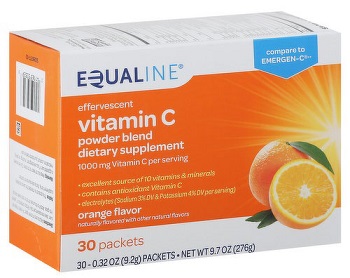COVID-19 News: Dutch Study Finds That Most Hospitalized COVID-19 Patients Have Low Levels of Serum and Intracellular Vitamin C
Thailand Medical News Team Aug 22, 2023 1 year, 7 months, 4 weeks, 1 day, 8 hours, 7 minutes ago
COVID-19 News: In the ongoing battle against the SARS-CoV-2 virus responsible for COVID-19, researchers continue to explore various aspects of the disease, seeking insights that could lead to improved treatments and outcomes for patients.

One area of investigation has focused on the role of micronutrients, such as vitamin C, in bolstering the immune response against the virus. A recent study conducted by Maastricht University Medical Center in the Netherlands has shed light on the relationship between vitamin C levels and the severity of COVID-19 in hospitalized patients, highlighting the potential importance of maintaining optimal vitamin C levels for immune function and disease management.
The Role of Vitamin C in Immune Function
Vitamin C, also known as ascorbic acid, is an essential micronutrient that plays a critical role in human immune cell function. It is not only a powerful antioxidant that helps protect cells from oxidative stress but also has immunomodulatory properties that influence the balance between pro-inflammatory and anti-inflammatory responses. Various immune cells, including neutrophils, T cells, B cells, and natural killer cells, rely on adequate vitamin C levels to carry out their functions effectively.
Interestingly, the human body is unable to produce vitamin C on its own due to the inactivation of the Gulo gene through evolutionary processes. As a result, humans must obtain vitamin C from their diet, and deficiencies can lead to a weakened immune system and other health issues.
Unraveling the Link Between Vitamin C and COVID-19
The Dutch study aimed to unravel the connection between vitamin C levels and COVID-19 severity among hospitalized patients. Researchers investigated both serum vitamin C levels and intracellular vitamin C levels in peripheral blood mononuclear cells (PBMCs) of 70 COVID-19 patients during their first and fifth days of hospitalization. The clinical severity of COVID-19 was also evaluated at these time points.
The study's findings were notable. A substantial portion of hospitalized COVID-19 patients exhibited low levels of serum and intracellular vitamin C. Specifically, 36% of patients had hypovitaminosis C (lower than optimal vitamin C levels), and 15% had vitamin C deficiency. Interestingly, patients with more severe or critical cases of COVID-19 were more likely to have low serum vitamin C levels compared to those with moderate illness.
Exploring Intracellular Vitamin C Levels
What sets this study apart is its examination of intracellular vitamin C levels within immune cells. While serum vitamin C levels can be influenced by acute changes, such as diet and external factors, intracellular levels are thought to better reflect the body's vitamin C storage status. Intracellular vitamin C concentrations can be significantly higher than serum levels and are less susceptible to acute fluctuations.
Intriguingly, the study observed a decline in intracellular vitamin C levels in the COVID-19 patient cohort as compared to a healthy control group. Moreover, during hospitalization, intracellular vitamin C levels continued to decline, while serum levels remained relatively stable.
This suggests that immune cells might be utilizing vitamin C more actively during
infection, potentially due to its antioxidant and immune-modulating functions.
Implications for Future Research and Clinical Practice
Although the study did not definitively establish vitamin C levels as biomarkers for predicting COVID-19 severity, it offered valuable insights into the complex relationship between vitamin C and the immune response to SARS-CoV-2 infection. The observations made in this study highlight the need to address vitamin C deficiencies among COVID-19 patients, as low vitamin C levels may impact the immune response and disease progression.
Past
COVID-19 News reports have already indicated that Vitamin C could help in COVID-19 treatments and even Long COVID.
https://www.thailandmedical.news/news/study-shows-that-early-vitamin-c-treatment-reduces-risk-of-mortality-in-hospitalized-covid-19-patients
https://www.thailandmedical.news/news/covid-19-supplements-yet-another-study-advocates-vitamin-c-as-an-adjuvant-to-treat-covid-19
https://www.thailandmedical.news/news/covid-19-research-more-studies-showing-high-dose-vitamin-c-linked-to-faster-recovery-in-covid-19-patients-with-severe-conditions
https://www.thailandmedical.news/news/long-covid-italian-randomized-clinical-trial-shows-that-l-arginine-plus-vitamin-c-supplementation-helps-in-long-covid
The study's limitations, including the relatively homogenous nature of the patient cohort and the lack of patients with mild disease, emphasize the importance of conducting larger and more diverse studies to fully understand the implications of vitamin C levels on COVID-19 outcomes. Additionally, the study calls for further exploration of the mechanisms by which intracellular vitamin C is utilized by immune cells during infections, potentially leading to new strategies for enhancing immune responses and improving patient outcomes.
In the broader context, these findings contribute to the ongoing discussions about the potential benefits of vitamin supplementation as part of COVID-19 treatment and prevention strategies. While the study did not conclusively demonstrate a direct correlation between vitamin C levels and disease severity, it highlights the need for continued research in this area to unravel the intricate relationship between micronutrients, immune function, and infectious diseases.
Conclusion
The Dutch study conducted at Maastricht University Medical Center provides a glimpse into the intricate interplay between vitamin C levels and the immune response to COVID-19. By evaluating both serum and intracellular vitamin C levels in hospitalized patients, researchers have taken a significant step toward understanding how this essential micronutrient impacts disease severity and immune function. While more research is needed to fully grasp the complexities of this relationship, these findings underscore the importance of maintaining optimal vitamin C levels, particularly in the context of infectious diseases like COVID-19. As the scientific community continues to uncover the intricacies of the immune response and micronutrient metabolism, we are inching closer to more effective treatments and strategies for managing COVID-19 and other infectious diseases.
The study findings were published in the peer reviewed journal: Nutrients
https://www.mdpi.com/2072-6643/15/16/3653
For the latest
COVID-19 News, keep on logging to Thailand Medical News.
Read Also:
https://www.thailandmedical.news/news/breaking-news-prenol-from-fruits-could-possibility-emerge-as-an-antiviral-and-therapeutic-candidate-for-covid-19-and-long-covid-19
